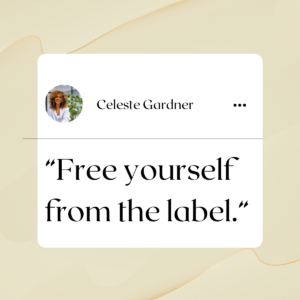Labels can seem innocuous at first glance. They help us categorise our experiences, define our roles, and communicate who we are to the world. Yet, there is a darker side to these labels that can significantly impact our mental health. When we attach our sense of self to labels, they can quickly become our entire identity, overshadowing the complex, dynamic individuals we truly are.

I first realised the harm of labels through my experiences in training. When people would ask me, “Who are you?” My response was simple: “I’m Celeste, a teacher and a runner.” Those labels felt like a badge of honour. They defined me, shaped my interactions, and provided a sense of purpose. But everything changed when I faced surgery that forced me to step away from running and shift to part-time teaching. Suddenly, I was stripped of the labels I had clung to for so long, leaving me feeling lost and avoiding situations whereby the question might occur.
In that moment, I recognised how deeply I had intertwined my identity with these activities. My worth seemed tied to what I did, and when those activities were no longer part of my life, I grappled with a profound sense of los
s. I had to navigate a new narrative, “I used to run, but now I am recovering from surgery.” Even this adjustment b
ecame another label that I struggled to shake off.
The truth is that our identities are not defined by our activities, roles, or even our experiences. These labels are temporary, and they can change at any moment. To reclaim my sense of self, I started to intentionally alter my language: “I am Celeste, and I enjoy running” rather than “I am Celeste the runner.” This shift in terminology was liberating; it allowed me to separate my identity from a singular aspect of my life.
The same principle applies to mental health. When we label ourselves as our mental health struggles, we risk losing sight of who we are beyond those experiences. For instance, you are not anxious; you are experiencing anxiety. You are not depressed; you are experiencing depression. This nuanced shift in language can have profound implications. By reframing our self-talk, we can liberate ourselves from the constraints of labels that society often imposes.
Being intentional with our terminology fosters a deeper understanding of our experiences without letting them define our identity. It helps us recognize that we are multifaceted beings, capable of growth and change. When we avoid rigid labels, we can begin to see ourselves as more than what society has sculpted and told us to be.
Let’s embrace a more fluid understanding of our identities. Rather than limiting ourselves with labels, we can celebrate our experiences and passions while remembering that they do not dictate our worth. In doing so, we can reclaim our true selves and empower each other to thrive beyond the confines of labels.